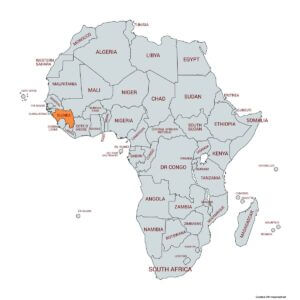- 关于邀请出席委内瑞拉帕 03-20
- 关于邀请参加CEEC第三届 03-04
- 关于邀请出席澳大利亚视 01-24
- 公告 11-18
- 关于邀请出席第二届中国 09-05
- “数智引领未来”能源大 06-30
- 墨西哥贸易与投资机遇论坛 06-19
- “绿能”擦亮中国能建金色 06-18
- 中海协陪同伊拉克代表团考 05-23
- 中国-伊拉克商务合作座谈交 05-19

Country overview: Guinea is located in west Africa bordering the Atlantic Ocean. It shares border with Guineas Bissau, Senegal, Mali, Ivory Coast, Liberia and Sierra Leone. It gained its independence from France on 2 October 1958. Its capital is Conakry with 8 Administrative regions. It is a multiparty Presidential Republic with the President sitting as the Head of State and Prime Minister as the Head of Government. It runs a unicameral national assembly and its official language is French. It is a predominantly Islamic country and it practices a civil law legal system based on the French civil code. It has an area size of 245,857 million sq km. Guinea is the source of several West African rivers, including the Senegal, Niger, and Gambia.
Demographic Information: Guinea has an estimated population of 12.53 million comprising mostly of younger population (less than 25 years) which makes up about 60.5% of the population, those in the age bracket of 25-64 years makes up about 35.6% of the population and above 65 years age group makes up about 3.9% of the population. Average population density is estimated at 53 inhabitants/km2. In terms of human development indicators, it has a life expectancy of 65.0 years (Women) and 61.3 years (Men). It achieved universal primary education with a 91.51% Primary enrolment rate in 2016 and overall literacy level of 30.4% as at 2015.
Broad Economic Overview: The Guinea economy mainly relies on agriculture and mineral production. It has the largest reserves of bauxite in the world, the largest untapped high-grade iron ore reserves, as well as gold and diamond and has significant hydroelectric potential. Agriculture is estimated to contribute about 24% of GDP and employs about 66% of the country’s workforce. Agriculture output and public investment continue to boost the country’s economic growth, as the mining sector also continues to play a prominent role in economic performance. Real GDP expanded 5.6% in 2019 having recorded 6.7% compounded annual GDP growth in the past 5 years. There is great potential for continuous growth in the economy given the country’s estimated 6.2 million hectares of potential farmland (75% unused), 64,000 hectares of irrigable land (less than 10% is developed) and it’s hydroelectric potential which is less than 6% tapped according to AFDB. Guinea currency is the CFA franc pegged to the Euro. Inflation remains high due to deteriorating road conditions resulting in increased travel times for perishable farm products from production to consumption areas. Main exports include bauxite, gold, diamond, fish, coffee etc. Major imports include petroleum product, transport equipment, foodstuffs, metals, machinery, textile etc.
Investment Opportunities: Guinea government plans to reduce its food trade deficit by 50% by 2025 and to create agribusiness processing zones. In 2013, the government amended its mining code which resulted in reduction of taxes and royalties. In 2014, Guinea demonstrated compliance with the requirements of Extractive Industries Transparency Initiative by publishing its mining contracts and was found to be compliant. Guinea maintains some state-owned enterprises for public utilities (water and electricity), but the government is gradually privatizing them. Investment opportunities are available in the following sectors agriculture, mining, energy and hydraulic, construction and real estate, fishing, health, ICT, education etc. Crumbling infrastructure, chronic electricity shortages and concerns about political uncertainties are some of the factors that continue to limit investment flow.
相关热词搜索:
上一篇:埃塞俄比亚投资环境介绍
下一篇:马拉维投资环境介绍